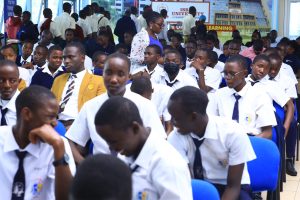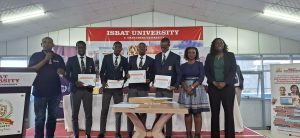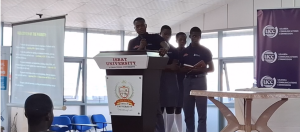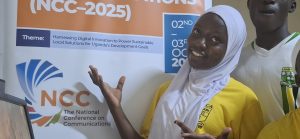Eng. Christine Mugimba Highlights Evidence-Based Innovation at the 9th NCC 2025
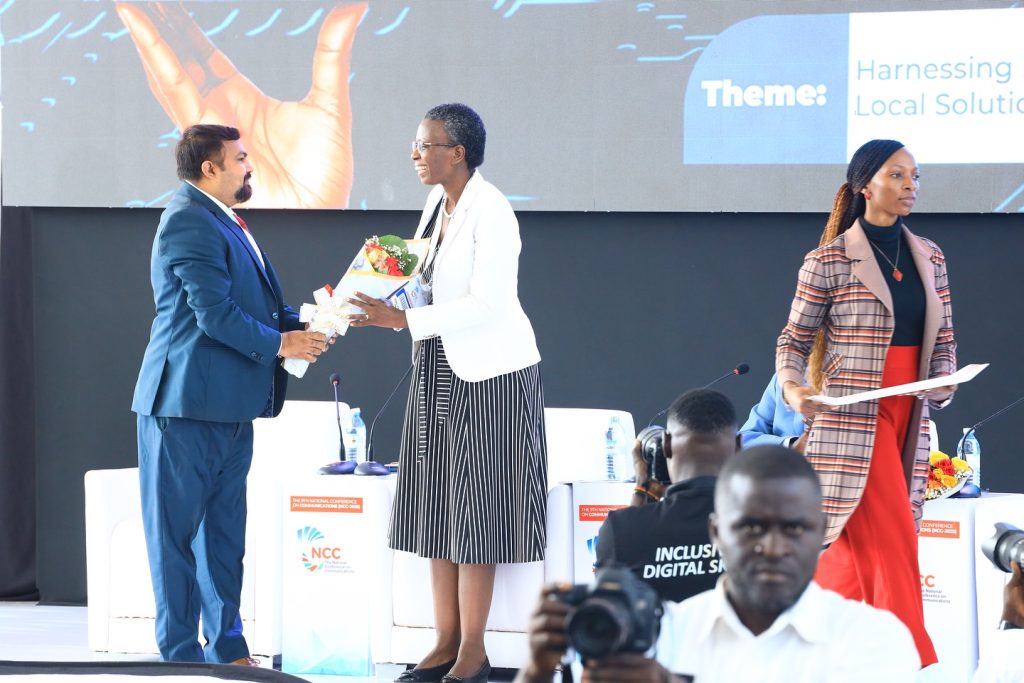
At the opening of the 9th National Communication Conference (NCC 2025) held at the National ICT Innovation Hub, Nakawa, Eng. Christine Mugimba, the Director of ICT and Research at the Uganda Communications Commission (UCC), delivered a thought-provoking and inspiring address centered on evidence-based research, local innovation, and collaborative growth in Uganda’s ICT ecosystem.
Her remarks painted a clear picture of how Uganda’s innovation journey is maturing — from academic research once confined to books, to practical solutions that now shape industries, empower students, and inform national decision-making.
The Power of Evidence-Based Research
Eng. Mugimba began her remarks by illustrating the real-world impact of evidence-based research, highlighting how artificial intelligence systems rely on trusted, verified data sources. She referenced Google’s AI Overview tool, which pulled statistics about Ugandan TikTok users from an official UCC publication.
“This example shows how critical verified local data is,” she noted. “It is proof that Uganda can generate knowledge that is globally recognized and used.”
She explained that this example aligns perfectly with the vision behind the National Communication Conference — to create a peer-reviewed national research platform that serves as a single source of truth for informed decision-making, innovation, and AI-driven development.
Through NCC, UCC envisions a research culture where scholars, policymakers, and innovators can rely on credible Ugandan data to guide strategies, regulate emerging technologies, and influence the country’s digital transformation trajectory.
The Genesis and Growth of the NCC
Eng. Mugimba took participants through the history of the NCC, reflecting on its humble beginnings over 15 years ago. The idea, she recalled, came from a university lecturer, Dr. Dorothy Okello, who realized that academic research in Uganda was “remaining in books” — valuable insights and discoveries were being generated in universities but never reaching the industry where they could make an impact.
“The conference was born from the desire to bring research out of classrooms and into the hands of practitioners,” she said.
The concept was later nurtured by a team of young engineers at UCC, proving that impactful ideas can be developed locally and need not come from external sources.
Since then, the NCC has evolved from a Makerere University-hosted event into a truly national platform, now co-hosted by ISBAT University and Gulu University, under the guidance of UCC. This expansion reflects the shared national commitment to using communication research and innovation to address Uganda’s collective development challenges.
“The NCC has grown from a university initiative into a nationwide movement for innovation,” Eng. Mugimba noted. “It is now a symbol of how collaboration can translate knowledge into national progress.”
Fostering Innovation at Every Level
Eng. Mugimba highlighted that innovation must begin early — not just in universities or corporate laboratories, but in secondary schools and communities. She shared that UCC, through its partnership with KAWA Uganda, introduced a national ICT Clubs Competition as part of the NCC framework.
Through this initiative, UCC and KAWA have worked with over 200 schools from Uganda’s Eastern, Northern, Western, and Central regions, inspiring students to identify and solve local challenges using science, technology, and creative thinking.
“We wanted students to start thinking about real problems and use both science and the arts to find solutions before they even join university,” she explained.
She emphasized that innovation is not limited to scientists — it’s about problem-solving across disciplines. Artists, communicators, and entrepreneurs also have a critical role in finding creative approaches to development challenges.
“Innovation is about finding new ways to solve old problems,” she added. “It belongs to everyone, not just to those in labs or lecture halls.”
🏭 Building Industry Collaboration and Harnessing Youth Potential
In a particularly engaging part of her remarks, Eng. Mugimba spoke about the introduction of the industry component within the NCC framework. She explained that UCC incorporated this aspect because of a “hunger for solutions” among Uganda’s private sector players, who often face challenges that can be solved through collaboration with academia.
“The NCC allows industries to tap into a pool of eager and talented students — a resource of ‘easy labor’ that can produce local, practical solutions to complex problems,” she said.
She urged industry leaders to actively engage with universities and innovation hubs, pointing out that companies do not always need to rely on expensive external consultants when they can partner with local researchers and students who understand Uganda’s unique environment.
“Industry players must start knocking on university doors,” she emphasized. “The answers to your challenges might already be in our classrooms.”
Her remarks underscored the importance of transforming universities into living innovation ecosystems — where research meets real-world challenges, and students become co-creators of national development.
Sustainable Local Solutions for Uganda’s Future
As she concluded her address, Eng. Mugimba reiterated that the ultimate goal of the National Communication Conference is to ensure that ideas move beyond presentations — evolving into concepts, prototypes, and solutions that drive real transformation.
She reminded participants that Uganda’s long-term vision is to use digital innovation to power sustainable local solutions that improve livelihoods, create jobs, and foster economic resilience by the year 2040.
“The NCC is a launchpad for homegrown innovation,” she said. “Through it, we can create technologies that improve lives and ensure Uganda’s growth is driven by its own people.”
Her call to action was clear: academia, industry, government, and the youth must work hand in hand to shape a digitally empowered, inclusive, and self-sustaining Uganda.
🎥 Watch the full speech here:

